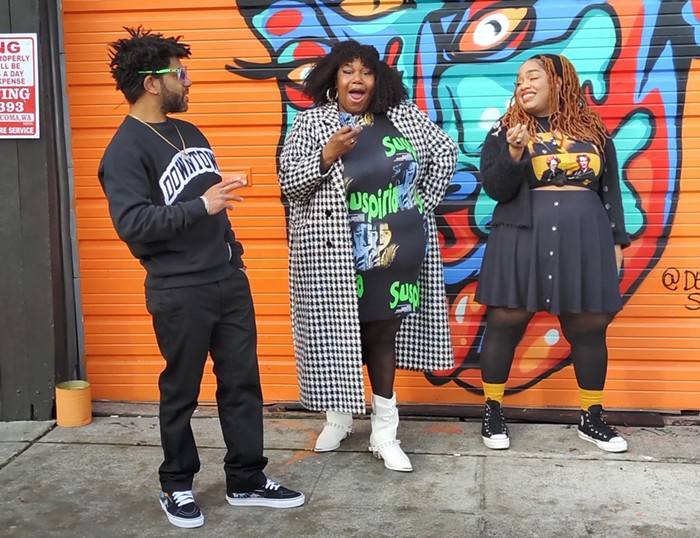People often summarize our state's experiment with legal weed by citing the amount of money spent by consumers ($2 billion) or the amount of cannabis tax collected ($400 million). But there's a third number that is equally impressive: 1.7 million pounds.
That's the amount of plant waste created by Washington State's legal marijuana industry since pot farms were first licensed in 2014, and that waste has a dirty secret. While the tax man and the pot dealer are getting their cash, most of the compostable waste created by the industry is being dumped in landfills.
It's easy to get an exact number for how much waste the industry creates—state law requires pot farmers to keep track of their waste down to the nearest gram—but finding out where all of this compostable waste is going is more difficult. Neither the Washington State Liquor and Cannabis Board nor the Department of Ecology has kept track of how cannabis waste is disposed of. Interviews with waste management and industrial composting companies in each of the four counties that produced the most amount of legal pot last month—Spokane, Thurston, King, and Snohomish Counties—reveal that industrial composting companies have collected little or no cannabis waste, with hundreds of thousands of pounds sent to state landfills.
Industrial composting systems are far more environmentally friendly than landfills because they quickly break down waste into usable soil. Putting compostable material into a landfill significantly slows natural decomposition.
Cedar Grove, the largest industrial composting company in King and Snohomish Counties, gathers compost from about 10 cannabis producers, according to Cedar Grove operations manager Clint Westmoreland. "We're probably collecting between 3,000 to 4,000 pounds a week of plant waste [from cannabis producers]," Westmoreland said. "The ones we deal with are maybe just a little more environmentally conscious. We only have a handful of customers, so I know we aren't working with every single one of them."
An analysis conducted by Top Shelf Data—a Capitol Hill startup that uses the state's public data to analyze the legal weed industry—shows that there are 207 producer and processor licenses in those two counties, and their farmers created more than 210,000 pounds of compostable cannabis waste last year.
In Spokane County, there are more pot producers and processors than any other county in the state, but none are composting. Scott Deatherage, an operations manager with Spokane County's largest industrial composting company, Barr-Tech, said they don't collect compost from any producers. "I've talked to a few guys and told them we could do it, but so far they haven't brought anything to us," Deatherage explained.
In Thurston County, where there are 76 producers and processors, only 10 cannabis farms contract with LeMay Pacific Disposal, the largest industrial compost hauler in the county. This according to LeMay recycling coordinator Emmett Brown, who wasn't able to estimate how many pounds of waste they collected from those farms.
In Whatcom County, where upwards of 215,000 pounds of plant waste was created in 2016, the industrial composter declines cannabis waste. "Our local composter [Green Earth Technology] is following federal law, so they are not accepting cannabis waste," said Rodd Pemple, the recycling manager for Bellingham's largest waste hauler, Sanitary Service Company. "So all of our local [cannabis] generators have been instructed to put it in the garbage."
Green Earth Technology did not return multiple calls for comment.
Some pot producers may be composting their material on site or hauling it to industrial composting facilities themselves, but it's unlikely that these methods account for the millions of pounds of waste created by the industry.
Trecia Ehrlich, who wrote a master's thesis at the University of Washington on the health and safety impacts of the state's legal weed industry, said a combination of tight regulations on plant waste and a lack of education may be hampering composting efforts. "There seems to be a challenge with education. I don't think that all farmers know they can compost it," Ehrlich commented.
Current liquor and cannabis board rules require pot producers to grind up their plant waste and mix it with an equal part non-cannabis waste. According to Ehrlich, some producers mix it with trash and some mix it with other organic material. If the producers mix it only with other compostable organics, their waste can still be sent to industrial composting facilities.
The state does not keep track of soil waste, but that may be an even bigger trash problem for the industry. Many farms burn through their soil quickly—sometimes throwing it out after just one use—and that soil may be taking up even more landfill space.
Brian Smith, a spokesman for the board, said he wasn't aware of any attempts by the state to encourage pot producers to compost. That's a shame, as 2017 is on track to be the biggest year yet for pot farms. If all of their composting waste is going to landfills, each bowl you smoke may as well be another layer of trash.

















